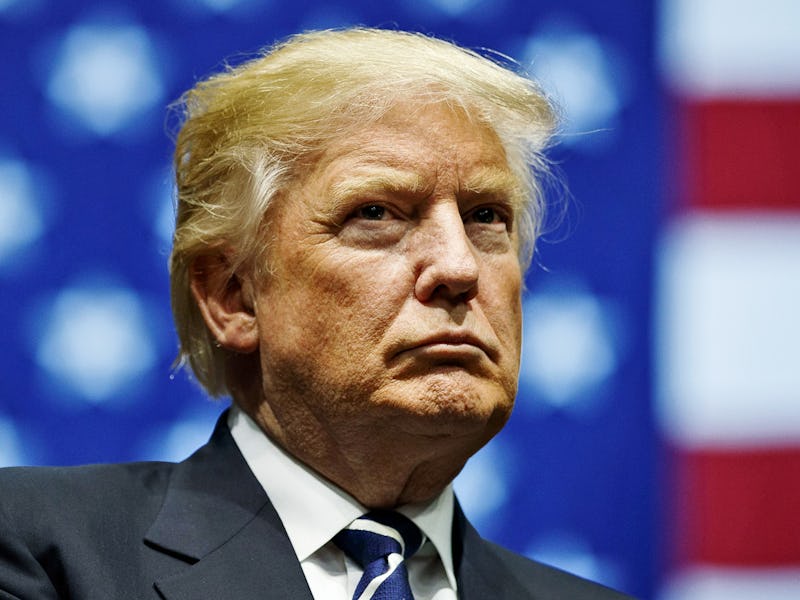U.S. 'Collective Narcissism' is Creating a Nation of Conspiracy Theorists
It's all about "us" versus "them."

Conspiracy theories, once the domain of fringy weirdos poring over microfiche at public libraries, are more mainstream than ever. Whether we’re talking about reptoids running the government, the United States military using alien technology, or the seemingly ever-present flat Earthers, researchers say there are a few characteristics unifying people who believe in these theories. One of these, argue psychologists in a new European Journal of Social Psychology paper, is a trait called “collective narcissism.” And it’s been driving growth in conspiracy thinking ever since President Trump was elected in 2016.
An increase in this= trait, which the team defines in the paper as “an exaggerated belief in the in-group’s greatness that depends on external validation from others,” was associated with a growth in conspiracy thinking from July 2016 until President Trump’s election in November 2016. Noting that the “us versus them” mentality of conspiracy theorists appeals to collective narcissists, Agnieszka Golec de Zavala, Ph.D., a senior lecturer in psychology at Goldsmiths, University of London, and Christopher Federico, Ph.D., a professor of psychology and political science at the University of Minnesota, Twin Cities explain that the 2016 U.S. presidential campaign exposed the electorate to an unprecedented level of information — or disinformation — that suggested rampant conspiracies and made people question their trust in the government.
Golec de Zavala and Federico show a statistically significant relationship between collective narcissism and conspiratorial thinking between July 2016 and November 2016.
“We posit that the antagonism between ‘us’ and ‘them’ underlying conspiracy theories appeals to collective narcissists because it fits their characteristic intergroup hostility,” write the study’s authors, who surveyed 1,685 people through the election cycle for measures of conspiracy thinking and collective narcissism. This longitudinal study allowed the researchers to track the same group of individuals over a period of time, recording changes in these people’s attitudes. In the final analysis, the researchers controlled for demographic factors such as age, income, gender, education, and race.
To tease out the effects of collective narcissism on conspiracy thinking, they also controlled for more specific variables including, just to name a few, ideological extremity, political knowledge, and a need for closure. While the effect of these first two elements may sound obvious, the third provides an interesting insight into conspiracy thinking, which often relies on people’s innate desire to have a tidy narrative that explains a world that’s often random and chaotic.
The researchers’ results showed that all of these political factors were associated with higher levels of conspiracy thinking, but that collective narcissism was the most consistent predictor.
Researchers found a strong correlation between collective narcissism and conspiracy thinking.
They propose that belief in conspiracy theories can grow when a group of people who display high levels of collective narcissism feels threatened, as was the case during much of the 2016 election, in which both Democrats and Republicans claimed that the rise of their opponent would spell the end of society. When this happens, the threatened in-group lashes out at other out-groups, and in the case of the 2016 election, this took the form of a growing belief in conspiracy theories — on both ends of the political spectrum — that helped explain why one group was being minimized or threatened by secretive actors.
“Individuals high in [collective narcissism] … react aggressively to threats to the in-group’s image,” the study’s authors write. “Accordingly, those high in [collective narcissism] react with intergroup aggression when the in-group is criticized or insufficiently recognized.”
Whether those conspiracies took the form of the fully unhinged, like PizzaGate, or more reality-based ideas, like Russian interference, political affiliation is less of a factor in conspiracy thinking than this in-group/out-group dynamic identified by the researchers.
Perhaps unsurprisingly, they note that the conspiracy thinking among collective narcissists gets even stronger when the group detects any hint that their hunches might be true. So, for anyone reading this article and saying “Aha, I knew it! Americans really are more polarized than ever” — or those of you saying, “Bullshit, this is just a smokescreen for the Deep State!” — rest assured that you probably fall into the ever-growing category of collective narcissists.